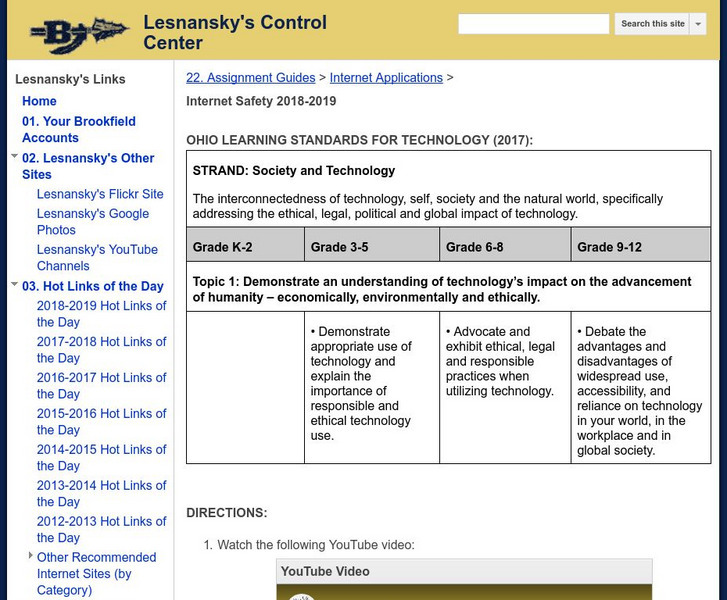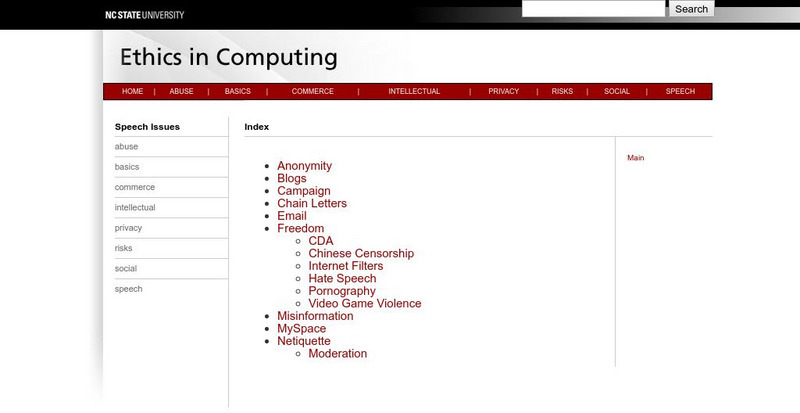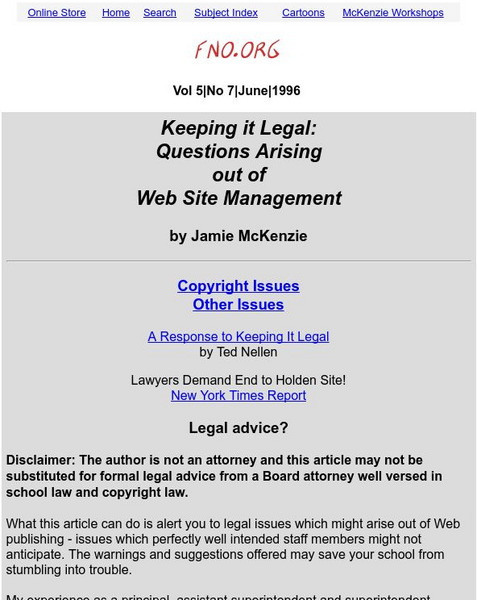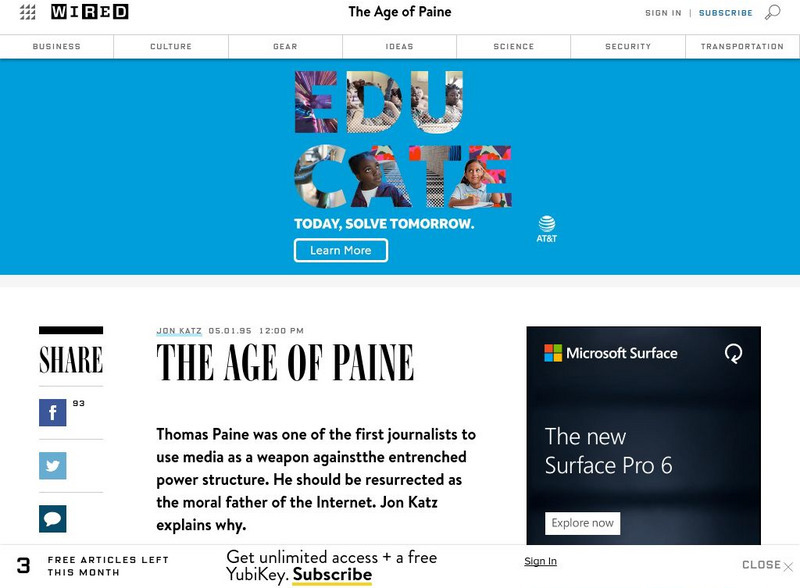Other
Brookfield High School: Lesnansky's Control Center: Internet Safety
In this activity, students watch a video on staying safe online, then create a slide presentation using Google Slides (or other software, e.g., PowerPoint) that explains the four main points stated in the video. [5:02]
NC State University
North Carolina State University: Ethics in Computing
This site contains a repository of information about a variety of computer ethics topics.
NC State University
North Carolina State University: Ethics in Computing: Speech Issues
Curated collection of links to articles, essays, and related topics on responsible use of the Internet and information technologies with respect to speech and online hate compiled and maintained by a university instructor.
Other
California State Univ.: Internet as Ethics Resource Tool
Site from California State University, Fullerton addresses ethical use of the internet with hyperlinks to valuable sources from the US Supreme Court to Thomas Jefferson and John Stuart Mill.
Alabama Learning Exchange
Alex: Computer Lab Rules and Technology Ethics
Lesson plan that reinforces computer lab rules and technology ethics as learners create newsletters or presentations.
REMC Association of Michigan
Remc Association of Michigan: 21 Things4 Students: 6. Cyber Safety
This learning module is made up of nine quests organized into sets of three. In the first set, students learn how to protect themselves online. In the second, they go through three simulations/games to learn how to protect their...
Other
Learn Safe: What Responsible Technology Use Looks Like
With constant access to technology, it can be difficult to monitor whether or not students are acting appropriately and responsibly on the Internet. Learn how to identify signs of responsible Internet usage and the warning signs of...
PBS
Pbs News Hour: A Penny for Your Thoughts, Movies or Music?
The ethical implications of downloading entertainment are huge. Explore this issue with students using this lesson plan. Be sure to include your library media specialist in planning.
Goodwill
Gcf Global: Use Information Correctly
In this tutorial, learn how to use information correctly to create quality content while protecting others' intellectual property.
Other
Albion: The Core Rules of Netiquette
Excerpts from the book "Netiquette" which gives etiquette rules for using the Internet. Ten rules with explanations are presented.
FNO Press
Fno: Keeping It Legal Education Web Sites Management
A must have for any teacher using the internet in the classroom! Questions are answered about what may be used legally by the teacher and students. Links to other sites also provided.
Common Sense Media
Common Sense Media: Cyber Smart! Student Curriculum Lesson: Can You Hack It? [Pdf]
Students learn that computers and electronic files are property and explore the reasons for, consequences, and ethics of teen hacking. This ISTE-aligned lesson plan for Grades 6-8 includes student activity and Home Connection sheets....
Other
Duane Goehner: Cognizance of Copyrights and Copy Wrongs
An article on "intellectual property" issues. Includes moral question of ownership, fair use guidelines, and new technology.
University of Hawai'i
University of Hawaii: Network Etiquette
This site is provided for by the University of Hawaii. Information on network etiquette with information on not sending chain mail, spamming, and other Usenet inappropriate uses.
Other
Brad Templeton: A Brief Intro to Copyright
This personal site provides an article on the copyright issues. Includes the basics, creative work, making copies, commerce, fair use/fair dealing, and some legal basics.
Common Sense Media
Common Sense Media: Education: My Creative Work (K 2)
Students learn the basics - title, name, and date - for crediting creative work. They discuss the importance of citing work, as well as recognizing that they should give themselves proper credit so that others can attribute their work...
Other
Business Software Alliance: B4 U Copy: Know the Risks
A nonprofit trade association of software industry professionals defines the risks associated with the use of unlicensed software.
Common Sense Media
Common Sense Media: Education: Lesson: A Creator's Responsibilities: Grades 6 8
Middle schoolers reflect on their responsibilities as creators and users of creative work. Requires Adobe Reader.
Other
Wired.com: The Age of Paine
An article from Wired Magazine describing Paine's use of the media to support the Revolution and comparing it to use of modern media such as TV, radio and the Internet.
Other
The Fourth Screen
A series of stories woven together to start a conversation with high school students about living our lives on & offline (on The Fourth Screen) more thoughtfully. Clicking on some of the slides directs you to websites and articles...
Media Smarts
Media Smarts: Your Connected Life: A Teen's Guide to Life Online [Pdf]
This guide is designed to help students who are just entering high school balance the demands their offline life with their digital one. The guide offers practical advice on a variety of activities kids like to do online, including...
Google
Google Applied Digital Skills: Understand Your Digital Footprint
Visualize your digital footprint by recording your online actions in a spreadsheet.













